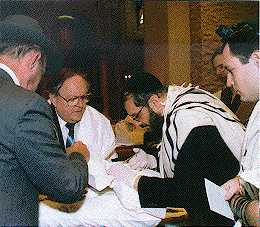 The word Bris means covenant; the word Milah, to cut.
The word Bris means covenant; the word Milah, to cut.
Ritual circumcision is the covenant G-d has established with the Jewish people through the commandment of circumcision.
Bris Milah
Judaism views body and soul as holy partners in serving G-d. Therefore, the bris is performed on the most physical part, for all of man is holy before his Creator. Bris Milah joins the forces of body and soul together in serving G-d.
Why on the 8th day?
The kabbalistic writings teach us that seven days represent the physical world of creation. Thus, when a child has lived for eight days, he has transcended the physical to the metaphysical. The covenant joining body and soul, physical and spiritual, can now take place. A bris has no meaning when performed before the eighth day.
The Bris ceremony has two parts:
the actual circumcision and the naming.
It is customary to honor family and friends to participate in holding the baby at various parts of the bris. The highest honor is to be the sandak, who holds the baby during the actual circumcision. It is not required to have a minyan- a group of ten at the bris. The parents can choose to have a private ceremony on the eighth day and have a reception on a later day when they are more rested.
The naming of the child
is the most emotional part of many bris ceremonies. Ashkenazic-European Jews have the custom of naming after the deceased. The immortalizing of a close relative or friend is a beautiful tradition. Sephardic Jews have the tradition to name after the living. A child may have one or more names, in accordance with the parents' desires.